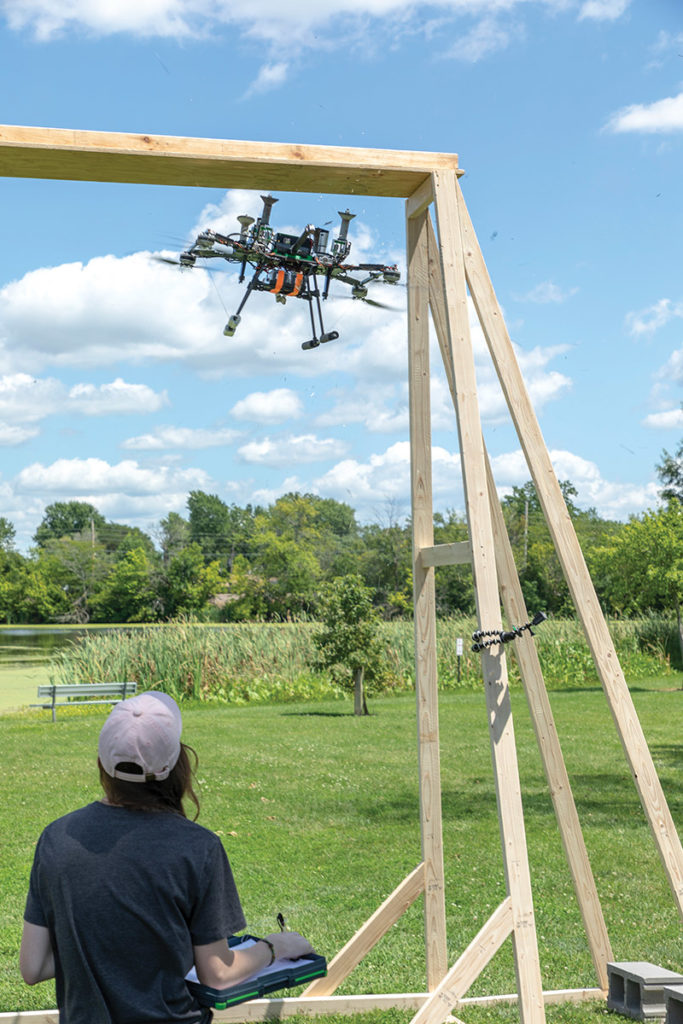UM System funds four new research centers
Posted by Lindsay Stanford

Mirragen, the wound-healing bandage developed at S&T, is made up of tiny glass fibers that give it the appearance of fluffy cotton candy. Photo by Sam O’Keefe/Missouri S&T
Missouri S&T will soon establish four new research centers and laboratories that build on the university’s strengths in materials science and engineering, civil infrastructure, and electrical power systems thanks to funding from a multicampus initiative of the University of Missouri System.
The projects are among 19 from the UM System’s four universities selected to receive funding through the system’s strategic investment program for research and creative works.
Through the program, Missouri S&T will receive funding for the following projects:
The Center for Glass Science and Technology (CGST), which will provide equipment and lab space to support research across the UM System related to the NextGen Precision Health Initiative and Institute. NextGen is expected to accelerate medical breakthroughs for patients in Missouri and beyond. The CGST builds on Missouri S&T’s previous success in glass research, including the development of bioactive glasses to treat cancer and open wounds. Richard Brow, Curators’ Distinguished Professor of materials science and engineering and interim deputy provost, will lead the center. Other faculty involved are Ming C. Leu, the Keith and Pat Bailey Professor of Integrated Product Manufacturing; Julia Medvedeva, professor of physics; Julie Semon, assistant professor of biological sciences; and Yezaz Ghouri, assistant professor of clinical medicine at MU Health Care.
The Center for Infrastructure Preservation and Resilience, which will bring together experts in data analytics, robotics and artificial intelligence to develop new approaches to the design, inspection and maintenance of infrastructure — from roads, bridges, buildings and tunnels to electrical power grids. The center will be led by Genda Chen, the Robert W. Abbett Distinguished Professor of Civil Engineering, and will involve Jenny Liu, professor of civil engineering; Suzanna Long, Hist’84, Phys’84, MS EMgt’04, PhD EMgt’07, professor and chair of engineering management and systems engineering; Zhaozheng Yin, associate professor of computer science; and William G. Buttlar, the Glen Barton Chair of Flexible Pavement Technology at the University of Missouri-Columbia.

The Center for Novel Carbon-Efficient Binders for Sustainable Infrastructure, where researchers will develop more sustainable and efficient binding agents for concrete. The bonding agents hold promise as being stronger, more durable and longer lasting. Kamal Khayat, the Vernon and Maralee Jones Professor of Civil Engineering, will lead the center. Other faculty involved are Sajal K. Das, the Daniel St. Clair Chair of Computer Science; Aditya Kumar, assistant professor of materials science and engineering; Honyang Ma, assistant professor of civil engineering; and George A. Zsidisin, the John W. Barriger Professor of Supply Chain Management at the University of Missouri-St. Louis.
A project titled “Energy Reliability and Resilience of Electrified Transportation Infrastructure” and the affiliated Electrified Transportation Distribution System Laboratory. The lab will be used to demonstrate and test new devices and systems for electric transportation, including light rail, electric ships, renewable energy systems and electric vehicle charging stations. Mehdi Ferdowsi, professor of electrical and computer engineering, will lead the project. Joining him are Jonathan Kimball, professor of electrical and computer engineering; Robert Landers, Curators’ Distinguished Professor of mechanical engineering; Ruwen Qin, associate professor of engineering management and systems engineering; Dan Lin, associate professor of electrical engineering and computer science at MU; and Jianli Pan, assistant professor of mathematics and computer science at UMSL.
In addition, Missouri S&T faculty are involved in two research efforts led by MU. Khayat is involved in a project to develop future urban infrastructure, and Stephen S. Gao, Curators’ Distinguished Teaching Professor of geology and geophysics, is part of a team that will develop capacity for using geospatial-enabled data for a breadth of research across the four-university UM System.
The winning projects were chosen because they either advance the systemwide NextGen Precision Health Initiative, support the core instrumentation and infrastructure of the NextGen Precision Health Institute on the Columbia campus, or serve other key priorities of the four universities.